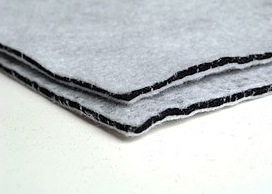
Chemical Engineers at The Insitute of Environmental and Human Health at Texas Tech University have developed a contamination wipe, Fibertect, made of non-woven cotton and a carbon core that has thus far been used as part of decontamination kits for removing chemical and biological warfare agents. Texas Tech claims that Fibertect also makes an excellent sponge to soak up large amounts of oil, i.e. that floating in the Gulf of Mexico caused by BP's Deepwater Horizon spill. According to Texas Tech:
If made into booms, it would not only absorb 40 times its weight in oil, but also detoxify much of it...
Texas Tech's Institute of Environmental Health sent an iReport to CNN to demonstrate how Fibertect works:
Fibertect is manufactured by a a company called Hobbs Bonded Fibers. You can download an information sheet on the product here. Texas Tech says that Fibertect would be particularly helpful on soaking up oil on the Gulf coastlines. This sounds like a better solution than anything that BP has tried so far.



Comments
Sounds fine, except that they make no mention of price or expense. I would also be curious if they have ever designed a system for an application as large as the Gulf of Mexico - I believe that is the "boom" idea they're talking about. Interesting.
I couldn't find a price on the manufacturer's website either. I wonder how much of this stuff they could make by next week - probably not enough. In which case it sounds like BP would have to pay them royalties for use of their technology and make it wherever they can.
Anything that can help clean the oil spill is worth trying, I just can't see how Fibertect is "the key to the gulf oil spill cleanup." Of course the Fibertect is patented, how else will money be made? There are plenty of other natural alternatives that might be better to use on such a large scale oil spill but they have not yet been attempted, because a single plant item cannot be patented. Lots of farmers are ready to donate hay to use in the clean up <a href="http://(http://www.triplepundit.com/2010/05/hay-solution-bp-oil-spill-clean-up-florida/)," target="_blank">(http://www.triplepundit.com/2010/05/hay-solution-bp-oil-spill-clean-up-florida/),</a> harvesting cattails for use seems like a viable solution as well. <a href="http://(http://www.huffingtonpost.com/michael-vazquez/on-the-proposed-use-of-ca_b_657336.html)" target="_blank">(http://www.huffingtonpost.com/michael-vazquez/on-the-proposed-use-of-ca_b_657336.html)</a> Another alternative is oil eating bacteria. <a href="http://(http://www.youtube.com/watch?v=R-yVBXfW9Z4)" target="_blank">(http://www.youtube.com/watch?v=R-yVBXfW9Z4)</a> Any kind of biomass would likely work as an effective absorbent. There needs to be a lot of people involved, organization, LOW TECH, work. Stop BP from using chemical dispersant which puts more toxins into the ocean, and makes cleaning up the oil extremely difficult. Get people to arrive at a certain point and dump whatever biodegradable plant mass into the water and have boats use nets to drag it through the oil. Fibertect has to be manufactured by one company and as far as I've heard many other requests for approval of alternatives have fallen on deaf ears. Seems like it's a total cash grab by this lone company who are using this guise of benefiting the clean up to just make $$$. I have not seen anything about how much this stuff would cost to fully utilize, and WHO WILL BE PAYING FOR IT.